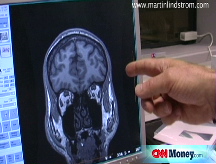Retail executives' bleak outlook
CEOs say they don't expect improvement until 2010, worry about long-term downturn.
(Fortune) -- The American economy is likely to deteriorate before it improves sometime in 2010, according to the chief executives of several large retailers, who gathered Monday night in New York for an annual dinner hosted by the investment bank Financo.
"I don't think we'll see growth until early 2010," said Mike Ullman, the CEO of J.C. Penney (JCP, Fortune 500), which - like other retailers - recently suffered through one of the worst holiday seasons in nearly four decades.
Perhaps more troubling than the current economic downturn is a longer-term shift in consumer purchasing that some industry experts are predicting.
"The consumer who has built his or her purchases on debt is now moving from debt to savings," said Larry Leeds, chairman of the investment firm Buckingham Capital Management. "That means they will buy less for years to come."
In years past, the retailers' gathering at the Harmony Club - which also includes executives from the private equity and real estate fields - has served as an opportunity for chest beating after a successful holiday shopping season.
This year, the mood was far more subdued. Many executives said the economic climate was the worst they'd seen in their careers.
It wasn't just the economy that had executives feeling gloomy.
Several CEOs said they were deeply worried about the Employee Free Choice Act, a piece of legislation that would amend the National Labor Relations Act to make it easier for unions to organize. Retailers fret that the passage of the bill, which has support among congressional Democrats as well as President-elect Barack Obama, would significantly increase their labor costs and decrease flexibility.
A sliver of hope on the horizon is the $775 billion stimulus package that President-elect Obama has promised to pass soon after he takes office. "But no one knows whether consumers will spend the money, save it or use it to reduce debt," said Financo chairman Gilbert Harrison.
Another silver lining for American retailers is a sharp decline in the cost of goods imported from China. As that country has slipped into its own economic slump, production prices have dipped 15% over the past year and may be at a 10-year low, said Rick Darling, the president of Li & Fung USA, a division of the large Hong Kong-based sourcing and manufacturing company.
In a panel discussion preceding the dinner, J. Crew (JCG) CEO Mickey Drexler went head-to-head with Neiman Marcus CEO Burt Tansky - disagreeing on just about everything, including when shoppers will start spending again. Tansky expects business to return to usual once the economy picks up, while Drexler argued that we're in for a more profound, longer-term pullback.
Elsewhere, there was plenty of gallows humor to go around:
*Matt Rubel, CEO of Payless ShoeSource, a discount shoe chain, to the CEOs of Neiman Marcus and Saks (SKS): "My wife buys a lot at Neiman Marcus and Saks, and I just wanted to thank you for all the great sales."
*Ullman of J.C. Penney, on discounting by luxury stores: "Our biggest problem is that Neiman Marcus and Saks are now competing in our price range."
*Robert Taubman, CEO of mall operator Taubman Centers (TCO): "I don't have anything uplifting to say, but please keep the rent checks coming." ![]()
-
 The retail giant tops the Fortune 500 for the second year in a row. Who else made the list? More
The retail giant tops the Fortune 500 for the second year in a row. Who else made the list? More -
 This group of companies is all about social networking to connect with their customers. More
This group of companies is all about social networking to connect with their customers. More -
 The fight over the cholesterol medication is keeping a generic version from hitting the market. More
The fight over the cholesterol medication is keeping a generic version from hitting the market. More -
 Bin Laden may be dead, but the terrorist group he led doesn't need his money. More
Bin Laden may be dead, but the terrorist group he led doesn't need his money. More -
 U.S. real estate might be a mess, but in other parts of the world, home prices are jumping. More
U.S. real estate might be a mess, but in other parts of the world, home prices are jumping. More -
 Libya's output is a fraction of global production, but it's crucial to the nation's economy. More
Libya's output is a fraction of global production, but it's crucial to the nation's economy. More -
 Once rates start to rise, things could get ugly fast for our neighbors to the north. More
Once rates start to rise, things could get ugly fast for our neighbors to the north. More








